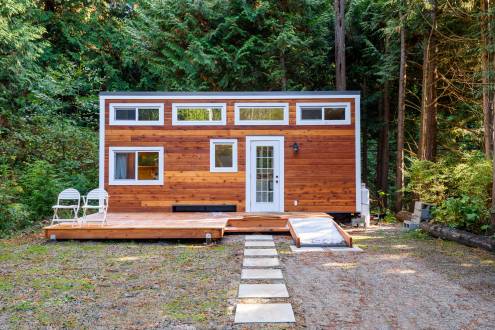There are a lot of laws and rules that you need to follow when building a tiny house. These rules vary from state to state.
This is not a comprehensive guide, but rather a basic overview of the laws that will help you understand what’s required when building your tiny house in Alabama.
First, it’s important to understand the difference between mobile homes and RVs, which are both legal in Alabama, and tiny houses which are not.
Tiny houses are considered camping trailers by most counties in Alabama, so they are illegal for two reasons: 1) camping trailers aren’t allowed in residential areas 2) if they were allowed, there would be no way for them to hook up water or electricity at an individual lot due to code restrictions.
However, if you were to put a tiny house on a foundation and add it to your home, it would be legal as long as it met the building codes for that particular county. If you want to live in your tiny house full-time, it would need to be hooked up to the water and electric grid. But if you are going to use your tiny house for vacationing or camping, then you wouldn’t need those utilities.
Mobile homes in Alabama must be built according to the Mobile Home Construction and Safety Standards Act of 1974. It is also required that they have a Certificate of Occupancy from their county government stating that they are legal for habitation.
If you’re building a tiny house on wheels that is not connected to utilities, then this is the law that you need to follow. However, there are some counties in Alabama that do not allow people to live in mobile homes full-time (like Madison County).
The Federal Fair Housing Act requires mobile homes and RVs to be treated equally when it comes to zoning laws. If your county allows RVs or mobile homes as permanent dwellings, then they must also allow tiny houses.
The National Electrical Code requires that all tiny houses have electrical outlets and switches that are grounded. They also need to be connected to the water and sewer lines at the individual lot. These rules apply to tiny houses built on wheels as well as ones built on foundations.
When building a tiny house in Alabama, you need to follow the International Residential Code for one- and two-family dwellings. This includes all of the safety regulations, as well as things like fire alarms and carbon monoxide detectors.
In addition to these building codes, all counties in Alabama have their own building codes that you must follow. These include rules for energy efficiency, fire alarms, and building inspections. Make sure to check with your county’s planning and zoning department before building your tiny house. They will have the most up-to-date information on local laws and building codes.
You may also want to check with your county’s health department to see if there are any special regulations regarding septic systems, wells, or anything else that may be required for a full-time dwelling.


